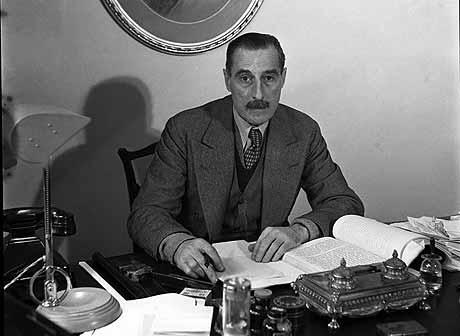Scoundrels and Pisspants: WW2 Ambassadors and Declarations of War February 16, 2015
Author: Beach Combing | in : Contemporary , trackbackDiplomats and ambassadors find themselves in a rather unusual situation. They are to represent their country, first and foremost, of course, but they are also to fraternize with their adopted country. This strange and strained sets of loyalties makes declarations of war particularly painful. The ambassador meets the foreign secretary with whom he has often had cordial, or even lovingly friendly relations and announces that the young men of his patria are forthwith to kill the young men of his opposite number’s patria. There were dozens of declarations of war in the Second World War, and some of these awkward accounts have been carefully kept for posterity. They make for good reading, though the reader probably wouldn’t have wanted to have been in the protagonists’ shoes.
Take Nevile Henderson’s longest journey, his trip to the German foreign minister to announce Britain’s ultimatum, which meant, of course, war. Ribbentrop (something of a moral coward in these matters) sent a translator, Paul Schmidt to meet His Royal Majesty’s Ambassador at 9.00 am and Henderson (pictured above) shook hands but refused to sit. Schmidt later included a description of Henderson reading ‘with deep emotion’ the communication from Chamberlain. Then, Henderson, an appeaser and a gentleman turned to Schmidt, someone not far off an office boy, and said ‘I am sincerely sorry that I must hand such a document to you in particular, as you have always been most anxious to help.’ Schmidt declared in kind and the two nations were just minutes away from war: the ultimatum expired at 11.00 am GMT.
Then there was Count Ciano’s declaration of war on France 10 June 1940. François-Poncet the French ambassador listened to Ciano’s careful and polite declaration and announced ‘It is a blow with a dagger to a man who has already fallen. I thank you nonetheless for using a velvet glove.’ François-Poncet continued that he could not ever consider Ciano or, indeed, any Italian as an enemy: a grossly unprofessional comment in the circumstances but one that only a fool would condemn. He did have a parting shot at the door, though: ‘The Germans are hard masters. You, too, will learn this.’ Ciano decided not to answer (‘this did not seem to me the time for a discussion’) and then in one last show of friendship François-Poncet patted Ciano’s aviator’s uniform and said simply ‘Don’t get yourself killed’, advice that regrettably Ciano did not follow.
However, in other meetings there were rawer emotions that surged up. After François-Poncet, Ciano had to meet Sir Percy Loraine, the British ambassador, who kept a strictly business like but gracious air: as Churchill said of his ‘gentle’ telegram to Japan declaring war ‘when you have to kill a man it costs nothing to be polite’. They exchanged ‘a long and cordial handshake at the door’ where Loraine, however, felt obliged to remind Ciano ‘that Britain is not in the habit of losing her wars.’ Secretary of State Hull, who had just heard that most of the Pacific fleet was at the bottom of Pearl Harbor simply shouted after the (extremely diplomatic) Japanese delegation: ‘scoundrels and pisspants’. A nice balance between dignity and humanity was achieved, meanwhile, by Molotov who, on being handed the German declaration of war in 1941 replied with the pathetic: ‘Surely we have not deserved that?’ When Ribbentrop in Berlin talked war on the same day, Berezhkov the Russian translator, reported that ‘His face was swollen and purple. He had obviously been drinking heavily.’
Other interesting war declaration encounters: drbeachcombing AT yahoo DOT com
24 Feb 2015: Mike Dash writes in with an interesting point: ‘Surely it is more likely that Hull said “pissants” – that is, “Insignificant or contemptible persons or things” (OED)?’
27 Feb 2015 Stephen D writes in with this great extract: Ciano also records, with what truth I do not know, a bizarre conversation between the Hungarian Ambassador to Washington and an American official (I’m quoting this from memory, details may be slightly out).
AO: Good day, sir, and what can I do to help you?
HA: I have come to inform you that Hungary has declared war on the United States.
AO (still reeling from news of Pearl Harbor, and rather vague about central Europe): Hungary, Hungary, now let me see. You’re a republic, right?
HA: Not at all, we are a kingdom.
AO: Oh, so you’re ruled by a king?
HA: No, we’re ruled by an admiral.
AO (map of Europe crystallising in his mind): I didn’t realise Hungary had a coastline and a navy.
HA: We don’t.
AO: Well, whatever about that, why do you want to declare war on the US? I didn’t realise we had any disagreement with you at all.
HA: No, we have nothing against the US.
AO: Then maybe you have some quarrel with one of our allies, and you feel you need to go against us also? Is it with the British, the Dutch, the Belgians, the Norwegians – surely not with the Norwegians?
HA: No, we have no grievances at all against any of those.
AO: Then who do you have grievances against?
HA: THE ROMANIANS! [followed by passionate denunciation of Romania and all its works].
AO: Well look, I don’t like to be telling you your business, but shouldn’t you maybe go and declare war on Romania?
HA: Oh no, we couldn’t possibly do that. They’re our allies.
(AO stops trying to understand Central Europe.)
27 Feb 2015: Philip C writes in with this obscene but amusing British diplomatic letter from the war.



